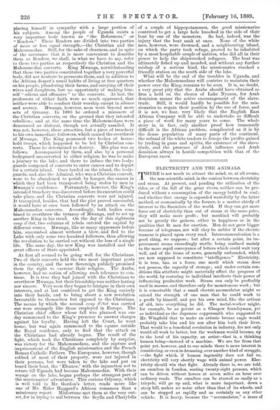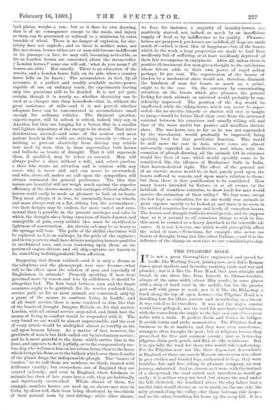ELECTRICITY AND THE ANIMALS. T HERE is not much to attract
the mind, or, at all events, the non-scientific mind, in the contest between electricity and steam. At present, and pending the utilisation of the tides, or of the fall of the great rivers, neither can be pro- duced without a consumption of the energy bottled in coal ; and whether that energy is expended wastefully by the latter method, or economically by the former, is a matter chiefly of interest to the financiers of the world. If they can get more force out of electricity than out of steam at the same price, they will make more profit ; but mankind will probably not be greatly the gainers, either in happiness or in the qualities that fit men for exertion. Men do not grow bigger because of telegrams, nor will they be nobler if the electric tramcar is placed upon every road. Intercommunication is a good thing, we suppose ; but after a certain point, its im- provement seems exceedingly sterile, being confined mainly to the more rapid conveyance of letters which could wait very well, and of the items of news, generally unfounded, which are now supposed to constitute " intelligence." Electricity, it is true, has, as a force, one merit which steam does not possess, the capacity of storage ; and under certain con- ditions this attribute might materially affect the progress of the world, by restoring to individual intellects their power of influencing productive work. Steam can only be profitably used in masses, and therefore only for monotonous work ; but it is conceivable that a small electric accumulator might so extend the strength of one man that he could work to a profit by himself, and put his own mind, like the artisan of old, into everything he did. The metal-worker might, for example, be as potent as a Glasgow foundryman, yet as individual as the Japanese coppersmith who suggested to Mr. Wingfield that to make an artistic bronze eagle would probably take him and his son after him both their lives. That would be a beneficial revolution in industry, for not only would all work be better, but the workman would become, up to the level of his capacity, an artist—that is, a thinking human being—instead of a machine. We are far from that
point yet, however, and to our minds there is more interest in considering, or even in dreaming, over another kind of struggle, —the fight which, if human ingenuity does not fail us, electricity will very shortly wage with animal power. Elec- tricity should win that fight. Already there is, we are told,
an omnibus in London, seating twenty-eight persons, which can be driven without horses at seven miles an hour over
ordinary roads. The omnibus can be steered as easily as a tricycle, will go up and, what is more important, down a steep hill, makes no noise other than that of its wheels, and can be stopped as rapidly and as certainly as any other vehicle. It is heavy, because the "accumulator," a mass of
lead plates, weighs a ton ; but as it does its own drawing, that is of no consequence except to the roads, and injury to them can be prevented or reduced to a minimum by extra breadth of wheel. There is no danger of explosion, for elee- tricky does not explode ; and as there is neither noise, nor fire, nor steam, horses either are or soon will become indifferent to its passage,—a fact, we may add, becoming noticeable, as far as London horses are concerned, about the steam-roller. (` London horses ?' some one will ask, what do you mean ? all horses are alike.' Not exactly. There is an education of the streets, and a London horse falls on its side, when a country horse falls on its knees.) The accumulator, in fact, by all accounts, is a perfect and readily available motive-power, capable of use on ordinary roads, the experiments leaving only two questions still to be decided. It is not yet quite certain, though it is nearly so, whether electricity can be used at a cheaper rate than horseflesh—that is, without the great assistance of rails—and it is not proved whether adequate force can be concentrated in accumulators small enough for ordinary vehicles. The financial question, experts report, will be solved, is solved, indeed, they say, in America, but they are longing for a better, that is, a smaller and lighter, depository of the energy to be stored. That latter desideratum secured—and some of the acutest and most patient heads in the world are striving towards it—there is nothing to prevent electricity from driving any vehicle now used by man, that is, from superseding both horses and bullocks as beasts of draught. That it will supersede them, if qualified, may be taken as assured. Man will always prefer a slave without a will ; and, ceteris paribus, a slave who wants no attention and is content with any cover, who is never sick and can never be overworked, and who, above all, makes no call upon the sympathies, will always command the general preference. The idea that horses are beautiful will not weigh much against the superior efficiency of the electro-motor, and carriages without shafts or horses could easily be made as pleasant to look at as boats. They must always, it is true, be essentially boxes on wheels, and must always rest on a flat, oblong box, the accumulator ; but their designs may be endless, far more varied and orna- mental than is possible in the present carriages and cabs, in which, the draught-slave being conscious, of limited power, and susceptible of pain, every artistic idea must be sacrificed to lightness of construction. An electric cab may be as heavy as the springs will bear. The pride of the skilful charioteer will be replaced, as it is on railways, by the pride of the engineer; and in ten years we shall have drivers assigning human qualities to mechanical cars, and even bestowing upon them, as ex- perienced engine-drivers and old ship-captains are known to do, something indistinguishable from affection.
Supposing that dream realised—and it is only a dream as the telephone and the phonograph were once dreams—what will be the effect upon the relation of men, and especially of Englishmen, to animals ? Properly speaking, if men were governed more by reason and less by selfishness, it should be altogether bad. The first bond between man and the dumb creatures ought to be gratitude for the service rendered him, service paid, as far as most animals are concerned, only by a grant of the means to continue living in health ; and of all dumb service, there is none rendered to him like that of the beasts of draught. Imagine Britain, or, for that matter, London, with all animal service suspended, and think how the means of living in comfort would be suspended with it. The very bread we eat would be almost unprocurable, and the cost of every article would be multiplied almost as terribly as the call upon human labour. As a matter of fact, however, the gratitude of man is but little called out by involuntary service ; and he is more grateful to the horse which carries him to the hunt, and appears to do it joyfully, or to the comparatively use- less dog who welcomes him on his return home, than to the horse which brings his flour, or to the bullock which over three-fourths of the planet drags the indispensable plough. The " beasts of burden," as we call them, are nowhere, we think, treated with deliberate cruelty ; but everywhere out of England they are treated callously ; and even in England, where kindness to animals has risen of late years into a cult, they are habitually and injuriously overworked. Whole classes of them, for example omnibus horses, are used up, as slaves once were in Cuba, by sheer toil, their lives being shortened by two-thirds of their natural term by over-driving ; while other classes,
we fear, for instance, a majority of laundry-horses, are positively starved, not, indeed, so much by an insufficient supply of food as by indifference to its quality. Pleasure- horses are pampered, pet-horses are coddled, all dogs are made much of—which is their idea of happiness—but of the beasts which do the work, a large proportion are made to lead lives needlessly full of suffering, or at least needlessly deprived of their fair recompense in enjoyment. After all, unless there is positive ill-treatment, few men give a thought to the cab-horses whose labour adds to their own power of rapid action perhaps 10 per cent. The supersession of the beasts of burden by a mechanical slave would not, therefore, diminish the kindness of man for beasts so much as, a priori, ought to be the case. On the contrary, by concentrating attention on the beasts which give pleasure, the general feeling for such animals as survived would probably be con- siderably improved. The position of the dog would be unaffected, while the riding-horse, which can never be super- seded—for no electric tricycle or chariot will ever be taught to jump—would be better liked than ever, from the increased contrast between his conscious and usually willing aid, and that of the more useful but passive and mindless electric slave. The war-horse, too, so far as he was not superseded by the war-chariot, would gradually be improved, being specially bred for that particular function. This would be still more the case in Asia, where cows are almost universally regarded as benefactors, and where, with the cessation of plough-drawing, all the animals left in existence would live lives of ease which would speedily come to be considered, like the idleness of Brahminee bulls in India, their heaven-derived right. The effect of the general use of an electric motor would be, in fact, purely good upon the beasts suffered to remain, and upon man's relation to them but then, there is that qualification to be considered. How many beasts intended by Nature, or at all events by the habitude of countless centuries, to draw loads for man would survive the extinction of their utility P We fear none, except the few kept as curiosities, for no one would rear animals at great expense merely to be looked at, and there is no room in the settled countries for troops and herds of ownerless beasts. The horses and draught-bullocks would perish, and we suppose that, as it is natural to all conscious things to wish to live, this must be counted as a heavy drawback to the scientific ad- vance. It is not, however, one which would perceptibly affect the mind of man,—Venetians, for example, who never see beasts of draught, being just like other Italians,—and it is the influence of the change on man that we are considering to-day.







































 Previous page
Previous page